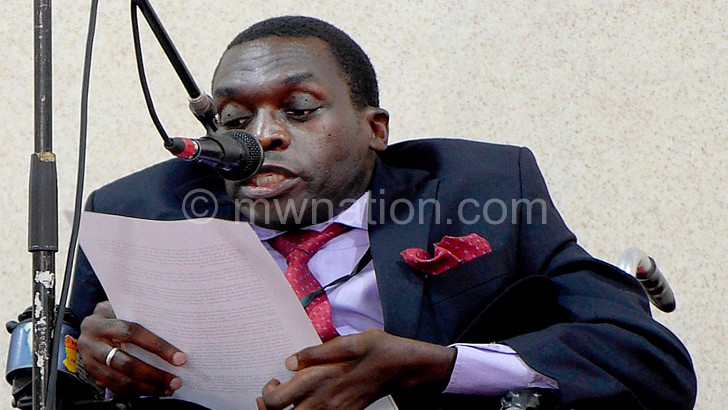The artist with strong self-image
The tale of Mussa Chiwaula, the former director of Federation of Disabled Persons in Malawi (Fedoma) and celebrated artist, will never stop amazing and inspiring people of all walks of life both on the local and international scenes.
Despite being bound to a wheel-chair as a survivor of polio from a tender age, Chiwaula has lived an inspiring life both artistically and professionally, as a social worker who advocated for the equal rights for persons with disabilities in Malawi. But this article explores his artistic life.
Born in 1955 in Zimbabwe, Chiwaula is originally from Mangochi. Converting from Islam, he joined Bible Believers Church (BBC) where his brother was a pastor.
Despite being born with the only ability of using his arms, Chiwaula established himself as a gifted artist in both screen printing and batiks between 1970s and 1980s.
He said he was born with a great passion for arts, but his focus grew when he faced severe discrimination as the formal job sector was rejecting his applications upon realising that he was a person with disability who was bound to a wheel-chair. However, this did not discourage him.
In 1979, Chiwaula was handed with a life-time inspiration from the late batik artist Victor Manong’a, who was living a normal and inspiring life despite living with a disability. He had a happy family too. This motivated Chiwaula and he decided to organise himself and start moving things forward.
“Inspiration is a great tool that one can get to start pushing things and keep them going in life. This is exactly what I got from the late Manong’a apart from his mentorship,” said Chiwaula, who had also attained a modest formal training in arts.
In the 1980s, lady luck smiled on Chiwaula when he met Victoria Fein, the wife of the then American Cultural Affairs Officer in Lilongwe, who trained him in drawing. He was introduced to Fein by the late legendary artist Kay Chiromo.
Since his encounter with Fein, Chiwaula had been actively working around professional artworks, particularly the theme of rural women, depicting their strength and everyday life. Most of these artworks include women mothering, cooking, drawing water, pounding maize and fetching firewood.
He does not hide the weighty gratitude and admiration for his mother, who showed him profound love and care.
“My mother played a great role in my life. Words are not enough to express this because she was simply an angel who gave me love and care,” said Chiwaula.
Apart from batiks, Chiwaula’s artworks have also been spinning around other mediums such as logos, carrier bags, T-shirts, screen printing and greetings cards that were being found in different selling points.
At one point, one of his cards was selected by the Sue Ryder Foundation and had it printed in the USA where it reportedly sold well.
Locally, Chiwaula’s artworks were usually found at the entrance of Sunbird Mount Soche in Blantyre where his customers, mostly foreigners, could buy from. This was apart from his workplace in Nkolokosa.
Throughout his career, Chiwaula had been working with prominent clients, including government departments and institutions and Non-Government Organisations (NGOs) such as Unicef, Family Life Welfare and the then Lever Brothers.
Among other prominent places, Chiwaula’s artworks had been displayed in New State House in Lilongwe. But he described his 1992’s Taipei trip in China as one of his finest moments as the former US president John F. Kennedy’s sister bought one of his batiks.
As an artist, Chiwaula made significant strides on both local and international levels, enough reason for the current crop of artists to get inspiration from.
For example, between 1980 and 1995, he was appointed as a representative of an American organisation called Very Special Arts, which specialises in the arts of persons with disabilities. It was under the support of this organisation which enabled him to travel to China in 1992.
Before exhibiting in China, Chiwaula also displayed his artworks in Sydney and Canada in 1990 and Australia in 1996 under the sponsorship of another organisation called Disabled People International.
In 1997, Chiwaula was awarded a Very Special Art Prize in Cape Town, South Africa by Unesco.
He also attended several workshops at international level including the one in Holland which focused on the commercial problems of persons with disability in arts and craft sectors.
However, the problems that haunted artists of Chiwaula’s time included lack of support and general appreciation of arts by local people. These are similar challenges facing artists of today. Even now artworks are generally bought by non-Malawians who find it meaningful, appealing and creative.
Perhaps, Chiwaula is one of the Malawian sons who gained an impressive international recognition through his influential artworks.
To achieve this, he determinedly overcame the barriers that ranged from discrimination to lack of self-assurance that continues to haunt many people, especially those with disabilities.
However, the legendary artist appealed for an enabling environment for persons with disabilities for them to excel in different fields.
He said more persons with disabilities should be encouraged to access formal education such as tertiary studies for them to contribute to the development of the country just like any other person, able of with a disability.
Indeed, gone are the times when persons with disabilities were reserved for some vocational training as they want to go to University of Malawi too to graduate with degrees in different areas of their choice.







